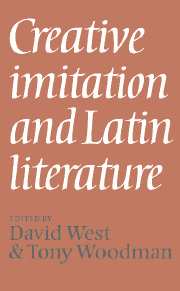Book contents
- Frontmatter
- Contents
- CONTRIBUTORS
- Prologue
- 1 DE IMITATIONE
- 2 PLAVTVS VORTIT BARB ARE: Plautus, Bacchides 526–61 and Menander, Dis exapaton 102–12
- 3 FROM POLYPHEMUS TO CORYDON: Virgil, Eclogue 2 and the Idylls of Theocritus
- 4 TWO PLAGUES: Virgil, Georgics 3.478–566 and Lucretius 6.1090–1286
- 5 HORATIAN IMITATIO AND ODES 2.5
- 6 IVDICIVM TRANSFERENDI: Virgil, Aeneid 2.469–505 and its antecedents
- 7 SELF-IMITATION WITHIN A GENERIC FRAMEWORK: Ovid, Amores 2.9 and 3.11 and the renuntiatio amoris
- 8 SELF-IMITATION AND THE SUBSTANCE OF HISTORY: Tacitus, Annals 1.61–5 and Histories 2.70, 5.14–15
- 9 LENTE CVRRITE, NOCTIS EQVI: Chaucer, Troilus and Criseyde 3.1422–70, Donne, The Sun Rising and Ovid, Amores 1.13
- 10 PYRAMUS AND THISBE IN SHAKESPEARE AND OVID: A Midsummer Night's Dream and Metamorphoses 4.1–166
- 11 EPILOGUE
- Notes
- Abbreviations and bibliography
- Select indexes
5 - HORATIAN IMITATIO AND ODES 2.5
Published online by Cambridge University Press: 12 March 2010
- Frontmatter
- Contents
- CONTRIBUTORS
- Prologue
- 1 DE IMITATIONE
- 2 PLAVTVS VORTIT BARB ARE: Plautus, Bacchides 526–61 and Menander, Dis exapaton 102–12
- 3 FROM POLYPHEMUS TO CORYDON: Virgil, Eclogue 2 and the Idylls of Theocritus
- 4 TWO PLAGUES: Virgil, Georgics 3.478–566 and Lucretius 6.1090–1286
- 5 HORATIAN IMITATIO AND ODES 2.5
- 6 IVDICIVM TRANSFERENDI: Virgil, Aeneid 2.469–505 and its antecedents
- 7 SELF-IMITATION WITHIN A GENERIC FRAMEWORK: Ovid, Amores 2.9 and 3.11 and the renuntiatio amoris
- 8 SELF-IMITATION AND THE SUBSTANCE OF HISTORY: Tacitus, Annals 1.61–5 and Histories 2.70, 5.14–15
- 9 LENTE CVRRITE, NOCTIS EQVI: Chaucer, Troilus and Criseyde 3.1422–70, Donne, The Sun Rising and Ovid, Amores 1.13
- 10 PYRAMUS AND THISBE IN SHAKESPEARE AND OVID: A Midsummer Night's Dream and Metamorphoses 4.1–166
- 11 EPILOGUE
- Notes
- Abbreviations and bibliography
- Select indexes
Summary
HORATIAN ‘IMITATIO’
Horace' ambition in the Odes as he states it at the end of the first poem is to have himself ranked with the lyric writers of ancient Greece. To join them, he had to imitate them. Imitation can have many levels; and the relation Horace indicates to the reader between his own work and the Greek lyrists' covers a wide variety of connections. Most obvious of these is the reproduction of lyric metres, above all the Sapphic and Alcaic stanzas. Likewise obvious are verbal echoes, especially those which begin a poem: thus in Odes 1.18 or 1.37 the first words translate the first words of poems of Alcaeus; or the description of winter and the invitation to drink which begin Odes 1.9 contain elements taken from another Alcaean opening. We can count on it that Odes which start in this way develop very differently from the Greek poem they allude to; but it is not only in such divergences that Horace shows himself original. For imitation itself can be conceived as a form of originality. This is in Horace's case partly because to imitate Sappho and Alcaeus is a novel thing to do:
… hunc fidibus nouis,
hunc Lesbio sacrare plectro
teque tuasque decet sorores
(Odes 1.26.10–12)princeps Aeolium carmen ad Italos
deduxisse modos
(Odes 3.30.13–14)hunc [sc. Alcaeum] ego, non alio dictum prius ore, Latinus uolgaui fidicen (Epistles 1.19).32f.)
But these same passages also tell us something more: that for Horace acknowledging his debt to his predecessors is also a way of characterizing completely, if summarily, his own achievement as a lyric poet.
- Type
- Chapter
- Information
- Creative Imitation and Latin Literature , pp. 89 - 102Publisher: Cambridge University PressPrint publication year: 1979
- 2
- Cited by



